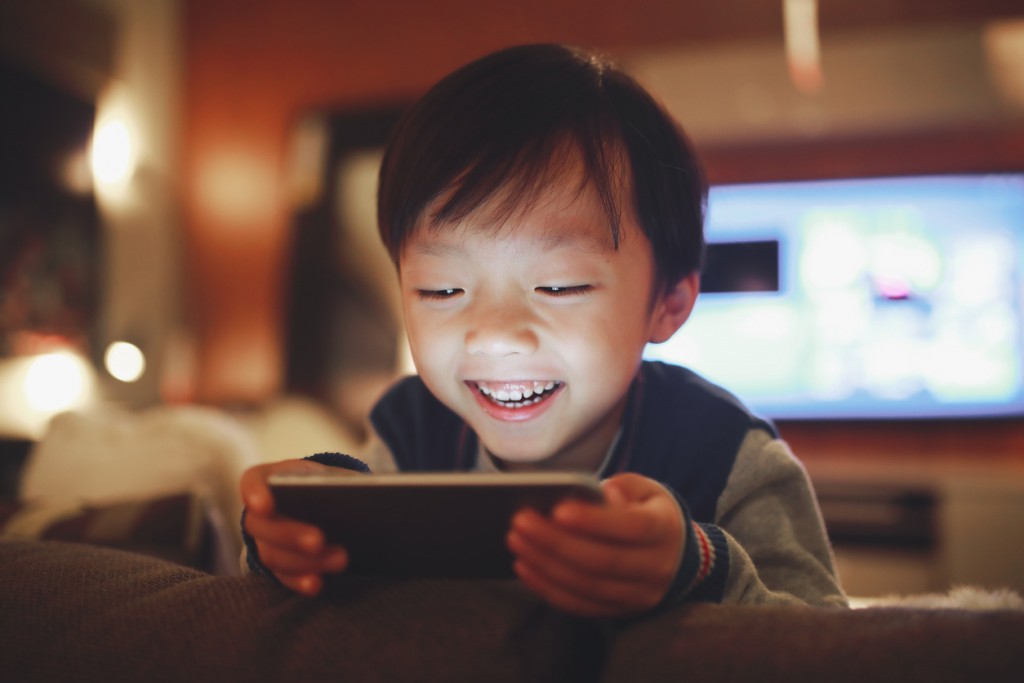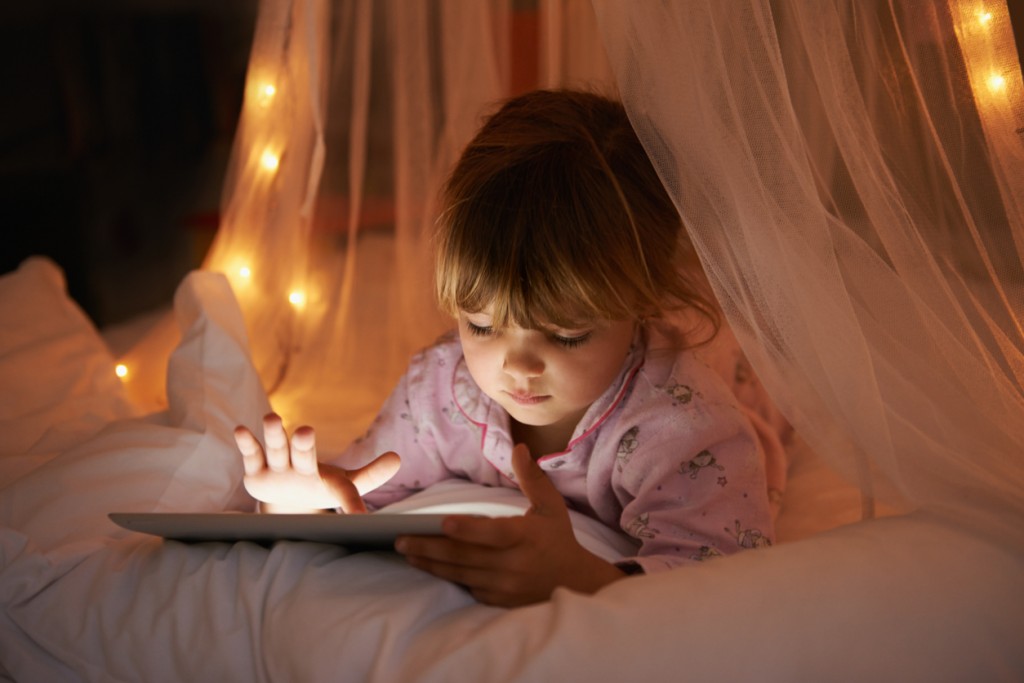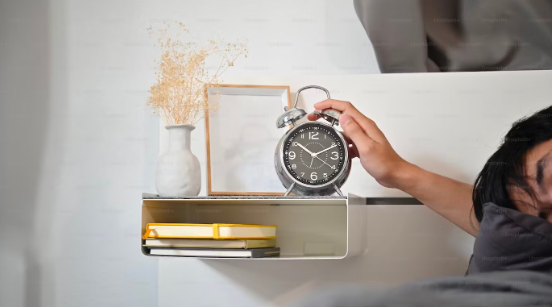How Screens Spoil Kids’ Sleep

Author: Jonathan Warren
In the past two decades, we’ve seen an explosion in the number and variety of electronic devices with screens. While this is great for keeping in touch, enjoying entertainment and getting things done, there’s an increasing body of evidence, and plenty of first-hand experience, that says that too much time spent in front of a screen can harm sleep – especially in kids.
 The scale
According to the National Sleep Foundation, some 43% of school-aged children have a TV or computer in their bedroom, and a 2007 survey discovered that 60% of teens use their mobiles at night once they’ve gone to bed. Ofcom figures from 2016 showed that one in ten 11 to 15-year-olds were still using social media after 10pm too.
In the UK, smartphone use among teens is increasing, with 96% of 16 to 24-year-olds having a smartphone, and a 2016 Ofcom report discovered that 41% of five to 15-year-olds have their own smartphones.
Increased social media, app and games use, as well as the increased portability of technology, means that kids have more opportunities than ever to stay logged in.
The problem
Screens, specifically the light they emit, can have a big effect on our sleep cycles, children included.
The importance of melatonin
It all stems from the blue light that displays give off. The light mimics regular sunlight, which the body’s sleep cycles are dictated by, and when our eyes take in the light, the body reduces its production of the sleep hormone, melatonin. When produced, melatonin makes us feel sleepy, so when using a screen around the time you should be heading to bed, you instantly feel a bit more awake than you otherwise would.
Busy brains
The simple act of using social media sites and interactive apps and games will also keep your brain alert and engaged – potentially a good thing during the day, but not exactly what the sandman ordered come nightfall. Simply put, your mind needs time to unwind after a busy day, which is why a good book is better than a fast-paced computer game.
Wake-up call
It might seem obvious, but it’s worth remembering that receiving texts and calls in the middle of the will probably wake you up, stopping your sleep cycle in its tracks. Deep sleep is the best kind of sleep for the brain, but being woken regularly will stop you experiencing it.
The health effects
The effects are real. A 2016 review of 20 different children’s sleep studies by researchers at King’s College London discovered that increased use of smartphones before bed had a clear effect on kids’ sleep patterns, quality of sleep and daytime sleepiness. They noted that bad sleep in childhood could result in obesity, a reduced immune system, reduced growth, and mental health issues. Being exposed to bright lights late at night can also damage the eyes, given that it stresses the retina.
The scale
According to the National Sleep Foundation, some 43% of school-aged children have a TV or computer in their bedroom, and a 2007 survey discovered that 60% of teens use their mobiles at night once they’ve gone to bed. Ofcom figures from 2016 showed that one in ten 11 to 15-year-olds were still using social media after 10pm too.
In the UK, smartphone use among teens is increasing, with 96% of 16 to 24-year-olds having a smartphone, and a 2016 Ofcom report discovered that 41% of five to 15-year-olds have their own smartphones.
Increased social media, app and games use, as well as the increased portability of technology, means that kids have more opportunities than ever to stay logged in.
The problem
Screens, specifically the light they emit, can have a big effect on our sleep cycles, children included.
The importance of melatonin
It all stems from the blue light that displays give off. The light mimics regular sunlight, which the body’s sleep cycles are dictated by, and when our eyes take in the light, the body reduces its production of the sleep hormone, melatonin. When produced, melatonin makes us feel sleepy, so when using a screen around the time you should be heading to bed, you instantly feel a bit more awake than you otherwise would.
Busy brains
The simple act of using social media sites and interactive apps and games will also keep your brain alert and engaged – potentially a good thing during the day, but not exactly what the sandman ordered come nightfall. Simply put, your mind needs time to unwind after a busy day, which is why a good book is better than a fast-paced computer game.
Wake-up call
It might seem obvious, but it’s worth remembering that receiving texts and calls in the middle of the will probably wake you up, stopping your sleep cycle in its tracks. Deep sleep is the best kind of sleep for the brain, but being woken regularly will stop you experiencing it.
The health effects
The effects are real. A 2016 review of 20 different children’s sleep studies by researchers at King’s College London discovered that increased use of smartphones before bed had a clear effect on kids’ sleep patterns, quality of sleep and daytime sleepiness. They noted that bad sleep in childhood could result in obesity, a reduced immune system, reduced growth, and mental health issues. Being exposed to bright lights late at night can also damage the eyes, given that it stresses the retina.
 How to beat the screen
There are a few ways you can beat the negative effects of screens and make sure that you and your kids get a great night’s sleep.
No screens at night
If you really want to make sure your kids aren’t affected by screens and devices, then consider turning them off a few hours before bedtime. As well as improving sleep, it’ll also give you and your family more opportunity to spend time together, instead of doing your own thing on your devices, consoles and computers. Click here to see our post on the importance of a bedtime story.
30-minutes’ warning
Lots of sources say that 30 minutes is the shortest amount of time you should leave between the point you turn your screens off and when you go to bed, as it gives your body chance to produce melatonin. If you’re a tech-loving family and don’t want to impose a full evening ban, then this is an easy option that still lets you stay connected.
Make sure that you keep the devices out of the room you sleep in though – the King’s College study found that even if a device was in the bedroom but not functioning, it could still have a negative influence on sleep quality.
There are all sorts of other things you can do to improve your kids’ sleep patterns and help them enjoy healthier, happier lives – click here to see our guide on creating a space for sleep. Sweet dreams!
Images: ©iStock.com/NI QIN, ©iStock.com/PeopleImages.
How to beat the screen
There are a few ways you can beat the negative effects of screens and make sure that you and your kids get a great night’s sleep.
No screens at night
If you really want to make sure your kids aren’t affected by screens and devices, then consider turning them off a few hours before bedtime. As well as improving sleep, it’ll also give you and your family more opportunity to spend time together, instead of doing your own thing on your devices, consoles and computers. Click here to see our post on the importance of a bedtime story.
30-minutes’ warning
Lots of sources say that 30 minutes is the shortest amount of time you should leave between the point you turn your screens off and when you go to bed, as it gives your body chance to produce melatonin. If you’re a tech-loving family and don’t want to impose a full evening ban, then this is an easy option that still lets you stay connected.
Make sure that you keep the devices out of the room you sleep in though – the King’s College study found that even if a device was in the bedroom but not functioning, it could still have a negative influence on sleep quality.
There are all sorts of other things you can do to improve your kids’ sleep patterns and help them enjoy healthier, happier lives – click here to see our guide on creating a space for sleep. Sweet dreams!
Images: ©iStock.com/NI QIN, ©iStock.com/PeopleImages.
 The scale
According to the National Sleep Foundation, some 43% of school-aged children have a TV or computer in their bedroom, and a 2007 survey discovered that 60% of teens use their mobiles at night once they’ve gone to bed. Ofcom figures from 2016 showed that one in ten 11 to 15-year-olds were still using social media after 10pm too.
In the UK, smartphone use among teens is increasing, with 96% of 16 to 24-year-olds having a smartphone, and a 2016 Ofcom report discovered that 41% of five to 15-year-olds have their own smartphones.
Increased social media, app and games use, as well as the increased portability of technology, means that kids have more opportunities than ever to stay logged in.
The problem
Screens, specifically the light they emit, can have a big effect on our sleep cycles, children included.
The importance of melatonin
It all stems from the blue light that displays give off. The light mimics regular sunlight, which the body’s sleep cycles are dictated by, and when our eyes take in the light, the body reduces its production of the sleep hormone, melatonin. When produced, melatonin makes us feel sleepy, so when using a screen around the time you should be heading to bed, you instantly feel a bit more awake than you otherwise would.
Busy brains
The simple act of using social media sites and interactive apps and games will also keep your brain alert and engaged – potentially a good thing during the day, but not exactly what the sandman ordered come nightfall. Simply put, your mind needs time to unwind after a busy day, which is why a good book is better than a fast-paced computer game.
Wake-up call
It might seem obvious, but it’s worth remembering that receiving texts and calls in the middle of the will probably wake you up, stopping your sleep cycle in its tracks. Deep sleep is the best kind of sleep for the brain, but being woken regularly will stop you experiencing it.
The health effects
The effects are real. A 2016 review of 20 different children’s sleep studies by researchers at King’s College London discovered that increased use of smartphones before bed had a clear effect on kids’ sleep patterns, quality of sleep and daytime sleepiness. They noted that bad sleep in childhood could result in obesity, a reduced immune system, reduced growth, and mental health issues. Being exposed to bright lights late at night can also damage the eyes, given that it stresses the retina.
The scale
According to the National Sleep Foundation, some 43% of school-aged children have a TV or computer in their bedroom, and a 2007 survey discovered that 60% of teens use their mobiles at night once they’ve gone to bed. Ofcom figures from 2016 showed that one in ten 11 to 15-year-olds were still using social media after 10pm too.
In the UK, smartphone use among teens is increasing, with 96% of 16 to 24-year-olds having a smartphone, and a 2016 Ofcom report discovered that 41% of five to 15-year-olds have their own smartphones.
Increased social media, app and games use, as well as the increased portability of technology, means that kids have more opportunities than ever to stay logged in.
The problem
Screens, specifically the light they emit, can have a big effect on our sleep cycles, children included.
The importance of melatonin
It all stems from the blue light that displays give off. The light mimics regular sunlight, which the body’s sleep cycles are dictated by, and when our eyes take in the light, the body reduces its production of the sleep hormone, melatonin. When produced, melatonin makes us feel sleepy, so when using a screen around the time you should be heading to bed, you instantly feel a bit more awake than you otherwise would.
Busy brains
The simple act of using social media sites and interactive apps and games will also keep your brain alert and engaged – potentially a good thing during the day, but not exactly what the sandman ordered come nightfall. Simply put, your mind needs time to unwind after a busy day, which is why a good book is better than a fast-paced computer game.
Wake-up call
It might seem obvious, but it’s worth remembering that receiving texts and calls in the middle of the will probably wake you up, stopping your sleep cycle in its tracks. Deep sleep is the best kind of sleep for the brain, but being woken regularly will stop you experiencing it.
The health effects
The effects are real. A 2016 review of 20 different children’s sleep studies by researchers at King’s College London discovered that increased use of smartphones before bed had a clear effect on kids’ sleep patterns, quality of sleep and daytime sleepiness. They noted that bad sleep in childhood could result in obesity, a reduced immune system, reduced growth, and mental health issues. Being exposed to bright lights late at night can also damage the eyes, given that it stresses the retina.
 How to beat the screen
There are a few ways you can beat the negative effects of screens and make sure that you and your kids get a great night’s sleep.
No screens at night
If you really want to make sure your kids aren’t affected by screens and devices, then consider turning them off a few hours before bedtime. As well as improving sleep, it’ll also give you and your family more opportunity to spend time together, instead of doing your own thing on your devices, consoles and computers. Click here to see our post on the importance of a bedtime story.
30-minutes’ warning
Lots of sources say that 30 minutes is the shortest amount of time you should leave between the point you turn your screens off and when you go to bed, as it gives your body chance to produce melatonin. If you’re a tech-loving family and don’t want to impose a full evening ban, then this is an easy option that still lets you stay connected.
Make sure that you keep the devices out of the room you sleep in though – the King’s College study found that even if a device was in the bedroom but not functioning, it could still have a negative influence on sleep quality.
There are all sorts of other things you can do to improve your kids’ sleep patterns and help them enjoy healthier, happier lives – click here to see our guide on creating a space for sleep. Sweet dreams!
Images: ©iStock.com/NI QIN, ©iStock.com/PeopleImages.
How to beat the screen
There are a few ways you can beat the negative effects of screens and make sure that you and your kids get a great night’s sleep.
No screens at night
If you really want to make sure your kids aren’t affected by screens and devices, then consider turning them off a few hours before bedtime. As well as improving sleep, it’ll also give you and your family more opportunity to spend time together, instead of doing your own thing on your devices, consoles and computers. Click here to see our post on the importance of a bedtime story.
30-minutes’ warning
Lots of sources say that 30 minutes is the shortest amount of time you should leave between the point you turn your screens off and when you go to bed, as it gives your body chance to produce melatonin. If you’re a tech-loving family and don’t want to impose a full evening ban, then this is an easy option that still lets you stay connected.
Make sure that you keep the devices out of the room you sleep in though – the King’s College study found that even if a device was in the bedroom but not functioning, it could still have a negative influence on sleep quality.
There are all sorts of other things you can do to improve your kids’ sleep patterns and help them enjoy healthier, happier lives – click here to see our guide on creating a space for sleep. Sweet dreams!
Images: ©iStock.com/NI QIN, ©iStock.com/PeopleImages.



